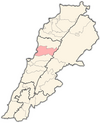Mzaar Kfardebian


Mzaar Kfardebian (Arabic: مزار كفردبيان — formerly Faraya Mzaar[1]) is a ski area in Lebanon and the largest ski resort in the Middle East. It is located one hour away from Beirut, the capital of Lebanon. It is also referred to as Ouyoune el Simane.[2]
History
[edit]In 1960, Sami Geammal, Emile Riachi and a group of pioneers installed the first ski lift imported from Switzerland, on the "refuge" hill and built the first four chalets in the region. One year later, they bought 160,000 square metres (40 acres) of property from Prosper Gay-Para in order to expand the resort area.[3][4]
In 1963, the Faraya Mzaar - Tourism and Winter Sports Company acquired the concession to build and operate ski lifts on lands belonging to the Kesrouan district municipalities. In 1965, the Mzaar Hotel opened its doors, and the company installed the first chairlift on the Jabal Dib Hills. The junction between "Refuge" and "Jabal Dib" was achieved in 1968 through the installation of the resort's third lift which was named "Jonction".
In the 1980s, during the civil war, the Mzaar Company was taken over by the Saudi Group al Mabani. In 1993, after the Lebanese civil war ended, the new group started expansion of the resort. In 2012, the resort's number of lifts reached 20 with around 80 kilometres (50 mi) of slopes.
Name controversy
[edit]"Mzaar" is the Arabic word for shrine or sanctuary. The highest peak in Ouyoune el Simane was called "Jabal el Mzaar" (mountain of the shrine) after a small Roman temple built on its top. It is believed that the Romans were using fire as signals to communicate between the coastal area and Baalbeck, or Heliopolis, through Faqra and the Mzaar peak.
The official name of the area is Ouyoune el Simane, which means "Spring of the Common Quail", and it is administratively under the jurisdiction of the municipality of Kfardebian, which is also the case for the Faqra ski resort.
Skiing area
[edit]Ski season usually stretches from early December to early April.[5]
The peaks of the Mzaar-Kfardebian mountain range vary between heights of 1,913 and 2,465 metres (6,276 and 8,087 ft). The highest peak is Mzaar, followed by Wardeh and Jabal Dib (mountain of the wolf) Peak. Three other peaks are well suited for beginners, and even more are adapted to skier of intermediate level. In addition, there are a number of cross-country trails.[6] Usually, opening hours during the week is from 8am to 3:30pm but it extends until 4pm during the weekend.[5] A variety of other activities and excursions are also available.[7]
Along with traditional alpine skiing, people can practice ski-doo, night skiing, snow boarding. Entertainment such as ski shows and fashion shows are organized to promote the resort.[8]
Natural and historical sites
[edit]
On the way to the ruins of Qalaat Faqra, one can see a natural water-crafted bridge called "Jisr al-Hajar" or the "Stone Bridge" with an arch measuring 38 metres (125 ft). [9]
Ski clubs
[edit]Mzaar-Kfardebian is home to different ski clubs.[citation needed]
See also
[edit]- List of ski areas and resorts in Asia
- Asian Alpine Ski Championships-2000, 2008, 2009, 2016, 2017, 2022.
References
[edit]Mema, J. P. (Photographer). (2008). Faraya from the sky. [Web Photo]. Retrieved from Snow Forecast, Snow Reports & Snow Conditions
- ^ "Ski Mzaar.com; September 27, 2015".
- ^ "Skiing in Lebanon". BootsnAll World Adventures. January 7, 2012. Archived from the original on November 15, 2017. Retrieved June 29, 2012.
- ^ "Tourism in Lebanon | May 1, 2012".
- ^ "History of Oyoune el Siman | May 1, 2012". Archived from the original on January 16, 2014. Retrieved June 29, 2012.
- ^ a b carter, T., dunston, L., & thomas, A. (2004). Syria and lebanon. (p. 424). Lonely Planet.
- ^ "Mzaar Ski Resort Interactive Map". skileb.com.
- ^ Ski liban. (n.d.). Retrieved from http://www.skiliban.com/
- ^ "G-string models promote Lebanon ski resorts". Middle East Online. March 16, 2007. Archived from the original on March 16, 2017. Retrieved November 9, 2013.
- ^ "Gallery - Jisr el Hajar, Lebanon". www.naturalarches.org. Retrieved Jun 12, 2020.
External links
[edit]- Mzaar ski resort, official website
- Mzaar ski resort and hotels in Faraya and Mzaar Lebanon

